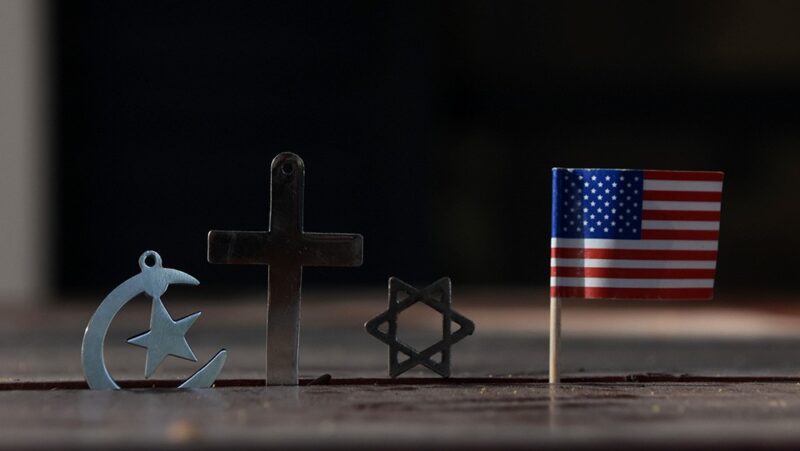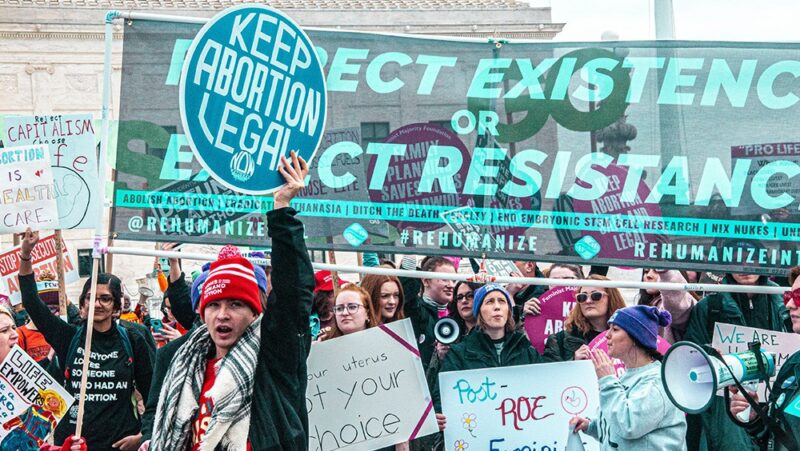You can have faith in the First Amendment.
What Interfaith Families Can Teach Us About the First Amendment
Millions of Americans have parents, siblings or children who don’t share their religious beliefs or practices. Interfaith families are increasingly common. According to the Pew Research Center, twice as many Millennials as compared to members of the Greatest and Silent generations say they grew up in an interfaith family. Because beliefs are incredibly personal and fundamental to someone’s identity, conversations across faith can be difficult, but when these dialogues break down, so can families and societies.
Watch the video playlist above to see how four interfaith experts, who are all part of interfaith families themselves, show how the First Amendment provides a framework for coexisting in religiously diverse families and in a diverse nation.
“The First Amendment says that the true religion of America is that we value the conversation.” – Bart Campolo
Bart Campolo’s journey of belief
To Tony Campolo and his son Bart, community is key, serving others is the mission and love is everything.
Tony Campolo is a famous evangelical Christian preacher. Bart was raised in this tradition and, for much of his life, he ministered as well. But at age 50, he realized he no longer believed in God. Telling his dad that Bart had lost his faith was one of the hardest conversations of their lives. But far from tearing the family apart, it was the beginning of a shared journey of understanding.
A young evangelical finds faith
Bart grew up with the traditions of his family’s church, but for him, belief came later. He enjoyed the community he found through church, particularly with his peers in youth groups. His profound moment of belonging and understanding came at a youth group retreat.
Bart became active in inner city youth ministry. “We were on a mission to save the world, and that was hugely attractive to me.” That mission also tested Bart’s belief.
Bart’s worldview is shaken
Firsthand exposure to poverty, crime and inequity challenged Bart’s faith in his church’s doctrine and led his beliefs to shift, even as he continued to be an active evangelist.
Then, a serious bicycle accident left Bart with a traumatic brain injury – and left him rethinking everything he thought he knew.
Bart realized he couldn’t believe anymore, as much as he wanted to. It was a difficult revelation. “What do you do when you’re a minister who no longer believes in God?” he wondered.
He would have to reshape his life. And he would have to tell his father.
“Talking about religion, talking about faith … really touches on something incredibly personal and incredibly vulnerable.” – Charlene Hong White, former campus ministry staff
Bart breaks the news to his dad
The first place most people learn to disagree effectively, to have constructive dialogue with people who think differently, says Bart, is in their families. This conversation, though, wasn’t going to be easy.
But without an open and honest discussion, the difference in belief threatened to drive a wedge between father and son. Taking a “live and let live” approach “really translates into ‘don’t know and don’t be known,’” says Bart, and he couldn’t let that happen to his family.
Bart sat his parents down the Thanksgiving after his realization to tell them his news. Looking back, he says one thing made the most difference: “Don’t start with what you don’t believe. Start with what you still share.”
That’s how the Campolos found a path forward.
Bart and Tony find a new path forward
Though their beliefs were decidedly different, their fundamental values were not. Bart still believes in love, caring for others and community. Tony celebrates how these ideals drive his son’s actions and are just as valid even though Bart no longer describes himself as Christian.
Tony and Bart kept their dialogue going, eventually turning their journey together into a book, “Why I Left, Why I Stayed.”
Bart became a humanist chaplain and later a therapist. Tony continued his evangelical ministry. Their family, like that of some 100 million Americans, is one in which members don’t share the same religious beliefs.
“All of us benefit from learning about the religions in our families, the religions in our neighborhoods, the religions in our workplaces.” – Susan Katz Miller, author of “Being Both: Embracing Two Religions in One Interfaith Family”
What Bart wants interfaith families — and everyone else — to know
The Campolos know that not all “coming out” conversations end like theirs, with a relationship strengthened instead of damaged.
Yet Bart says, the stakes are high, not only for interfaith families but for society if we are to thrive as a “pluralistic democratic society” in which people of all beliefs can belong.
Democracy is based on striving together toward the common good through dialogue and debate, and the First Amendment sets up a framework to ensure everyone can engage, discuss and debate openly and robustly.
Practicing dialogue skills, starting from a place of empathy and finding common ground can make difficult interfaith family conversations more fruitful and help bridge the divides that polarize our country.
And “that’s the true religion of America,” says Bart, “that we’re willing to let people who have different belief systems be part of the group.” It isn’t the easiest path, but it’s the right one.
The United States is the world's first attempt at religiously diverse democracy. We are the most religiously diverse nation in human history and the most religiously devout nation in the western hemisphere. That is remarkable. … people working positively together across lines of religious difference … this is what the epitome of a diverse democracy is.” – Eboo Patel, founder and president of Interfaith America
This documentary was made possible with generous support from The Andrew & Julie Klingenstein Family Fund.
Related Content


